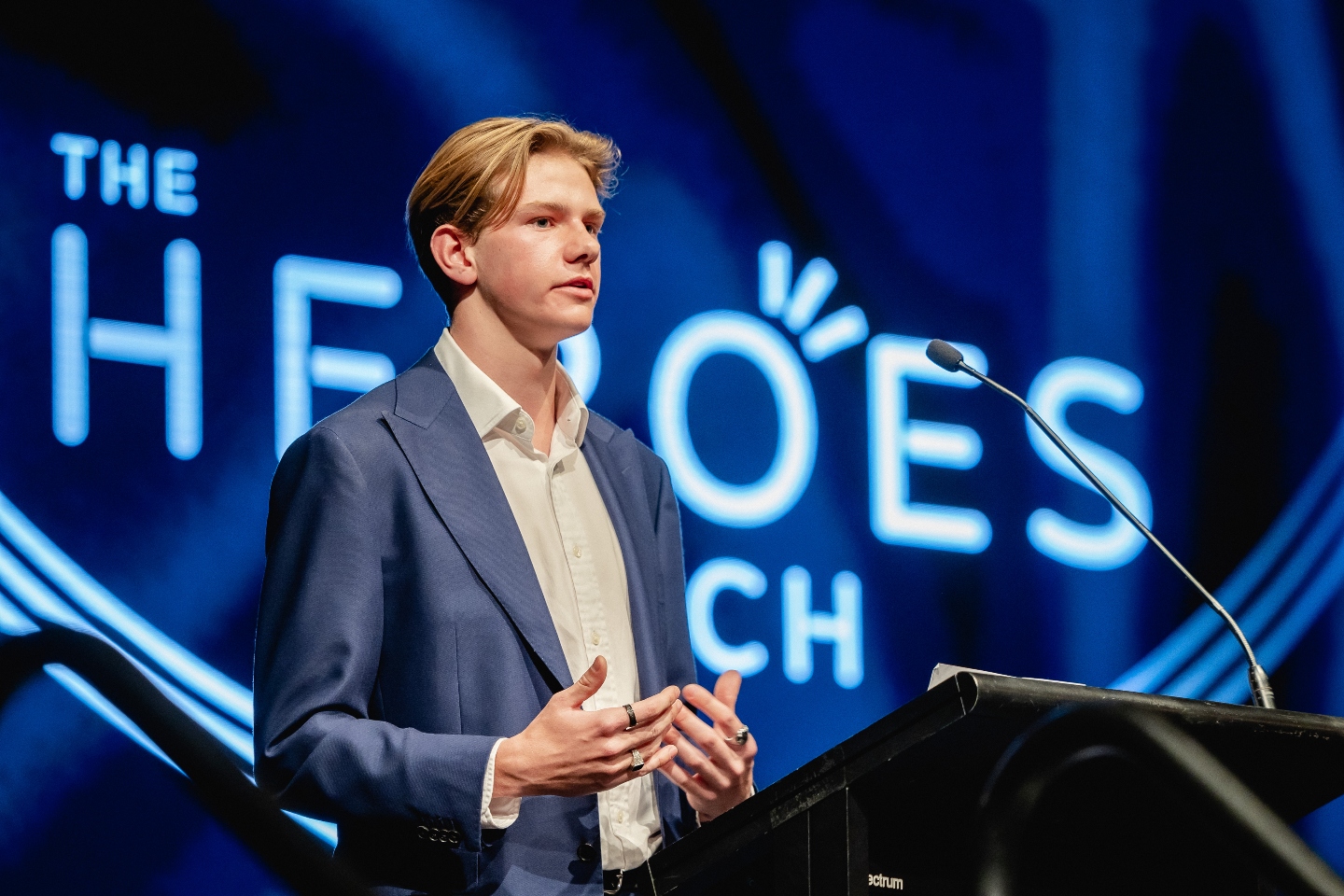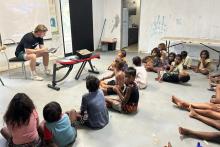Every April, a week-long celebration recognises the strength and resilience of young Western Australians and the initiatives helping to support the youth to thrive.


Every April, a week-long celebration recognises the strength and resilience of young Western Australians and the initiatives helping to support the youth to thrive.
This year for Youth Week WA, which runs from April 10 to 17, we shed light on the organisations nurturing the development of the next generation.
Youth mental health charity zero2hero has been delivering its Camp Hero program for 12 years, building the leadership and confidence skills of young people in WA.
Two Camp Hero alumni, both aged 18 years, have shared their personal experiences with the program and the valuable skills they acquired and now apply to their everyday lives.
Max Lane, who attended the camp in 2023, said his greatest takeaway from the program was learning how to identify early signs of suicidal thoughts in other people, which was delivered through the safeTALK suicide alertness training.
“This allowed me to detect the early warning signs in my friends back home that they were beginning to think about suicide and how to give them the help that they need,” Max said.
“The training also equipped me with the ability to be more observant of my friends and be able to better identify if some of my mates were having a bad day or if something is just not quite right which has been monumental in strengthening some of the relationships with my best friends.”
“Camp helped me develop the perspective to just go out there and be myself regardless of the situation and to know that I will be loved and appreciated for being who I am." zero2hero Camp Hero alumni Max Lane
Max said he also developed the ability to build connections with strangers, a skill that would be highly useful for his future.
“At the beginning of camp I did not know a single person, but I was made to develop friendships between different people during different activities and by the end of the camp I was friends with everyone there,” Max said.
“This has created a sense of self confidence in myself in social situations where I am now no longer afraid of being in situations where I don’t know anyone.
“It has also equipped me with the skills to be able to start and maintain interesting conversations with people which I will carry with me throughout my life.”

Camp Hero builds leadership skills and resilience in young people.
In reflection of zero2hero’s aim to help young people thrive, Max said Camp Hero was hugely beneficial to building his confidence and self-belief.
“Camp helped me develop the perspective to just go out there and be myself regardless of the situation and to know that I will be loved and appreciated for being who I am,” he said.
“In return, I was able to stand up and speak to over 500 corporate leaders at The Heroes Lunch in 2023 when I was 16 about camp, its impact on me and how instrumental it is in changing the lives of young people in our community.
“Camp instilled in me the confidence I needed to be able to throw myself into any situation and know I will thrive and succeed. As a result, I have been able to jump on so many opportunities and develop richer understandings and passions for new areas of my life.”
After camp, Max went on to serve as student wellbeing councillor at his high school Christ Church Grammar School and extended his engagement with zero2hero, becoming chair of the charity’s Youth Leadership Team and trekking the cape2cape as camp alumni representative.
Fellow Camp Hero alumni Leon du Toit, who attended the camp in 2024, said self-acceptance and honesty were key skills he developed through the zero2hero program.
“Camp taught me that if I just be myself, my people will find me. I don’t need to change myself to match their expectations. I can live honestly and truthfully every day, and I will be able to find people that connect with me, that support me, that I love,” Leon said.

Camp Hero alumni Leon du Toit.
“This has allowed me to build deeper and more meaningful friendships in my life, especially as I transition out of high school and into adult life.
“Another key skill I gained was active listening. Through the mentor groups we spent time in on camp, I was taught to hold space and engage with people with my body language.
“I learnt that it’s okay to sit in silence sometimes, and that that can be what people need. I have used this skill to help me resolve conflicts in my life, by making people feel understood so that we can work towards a common resolution rather than arguing against each other.”
Informed food choice, better outcomes for youth
Foodbank WA has also committed to enhancing the livelihood of young Western Australians by expanding its existing food nutrition program to target people aged 12 to 18 years.
The not for profit offers nom! program sessions for all ages and abilities, but this year funding support has enabled Foodbank WA to deliver a series of new nom! Youth sessions to help this cohort to make informed decisions about their health and wellbeing.
According to chief executive Kate O’Hara, the content of these sessions are specifically tailored to youth food habits to make it relevant and engaging for the audience.
“For example, there will be a topic to help illustrate how the age group can shop on a budget for after school snacks where we have a scenario of $10 to spend at a petrol station vs. take away shop vs. grocery shop and purchasing healthier options as opposed to ‘sometimes’ foods,” Ms O’Hara said.
“The sessions are packed with interactive workshops, curriculum linked education sessions and practical hands-on cooking classes.
“Our nom! Youth sessions teach essential food literacy skills and can empower youth by nurturing essential life skills and fostering a sense of belonging, creativity, and confidence.”

Foodbank WA's nom! Youth Headspace program
New program to support chronically ill youth
Navigating the teenage years is already a challenging period in a young person’s life, but it becomes that much more complex when chronic illness is introduced into the mix.
A young person in this situation can be left feeling isolated and alone and they often miss out on normal adolescent experiences, face social isolation and have poorer mental health than their peers.
A dynamic Perth Children’s Hospital (PCH) support program, funded by Perth Children’s Hospital Foundation (PCHF), will empower young people and help them thrive.
The Chronic Illness Peer Support Service (ChIPS) will welcome young people into a safe and supportive environment where they are no longer be defined by their illness.
The program will encourage young people to share experiences and learn from others, while expanding their social networks. Connecting and spending time with others can help to build confidence, resilience, and can transform young lives.
The power of creativity
Hospitals can be stressful and frightening, especially for young people, which is why PCHF is also dedicated to funding the PCH Arts program to introduce creative experiences to the hospital environment, improving the mental health and wellbeing of patients and their families.
Creative activities are known to reduce stress and anxiety, provide a sense of comfort and shorten hospital stays.
Landen Sturman, a 10-year-old boy from Mandurah, was impaled in the back by a steak knife in a freak accident and spent several days in Perth Children’s Hospital.
He underwent several hours of delicate surgery conducted by specialist neurosurgery and orthopaedic teams to have the knife removed, and was remarkably left with no lasting nerve damage.

Landen Sturman during his stay at Perth Children’s Hospital
During Landen’s stay at the hospital, he engaged in puppetry workshops funded by PCHF and discovered his talent for the artistic craft.
His mother, Emma, said she encouraged people to support PCHF to enable the continuation of creative experiences like this for children in hospital.
“The overall experience we had throughout Landen’s hospital stay turned a traumatic experience into something positive,” she said.
"Hospitals can be frightening places for children and their families, but we know that creative activities help people relax, feel better and enhance healing." PCHF CEO Carrick Robinson
PCHF funds a variety of other creative workshops, including mandala art to encourage adolescents to discover techniques to calm the mind and a digital Noongar art program that combines video animation and Claymation.
The latter workshops bring to life the story of the six Noongar seasons while fostering cultural awareness, a connection with the Noongar storytelling tradition and distracting patients and families from their worries.
PCHF chief executive Carrick Robinson said the generosity of donors enabled the foundation to fund positive patient experiences to make hospital visits less daunting and helped children to heal and flourish.
"Hospitals can be frightening places for children and their families, but we know that creative activities help people relax, feel better and enhance healing,” Mr Robinson said.
To help create more positive experiences for sick children and young people, and help them to thrive, please contact Perth Children’s Hospital Foundation. https://pchf.org.au/
















